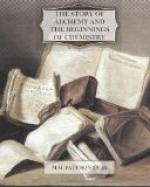These descriptions of elements and compounds also enable chemists to form a clear picture to themselves of any chemical change. They think of a chemical change as being; (1) a union of those weights of two, or more, elements which are expressed by the numbers attached to these elements, or by whole multiples of these numbers; or (2) a union of such weights of two, or more, compounds as can be expressed by certain numbers or by whole multiples of these numbers; or (3) a reaction between elements and compounds, or between compounds and compounds, resulting in the redistribution of the elements concerned, in such a way that the complete change of composition can be expressed by using the numbers, or whole multiples of the numbers, attached to the elements.
How different is this conception of a change wherein substances are formed, entirely unlike those things which react to form them, from the alchemical presentment of such a process! The alchemist spoke of stripping off the outer properties of the thing to be changed, and, by operating spiritually on the soul which was thus laid bare, inducing the essential virtue of the substance to exhibit its powers of transmutation. But he was unable to give definite meanings to the expressions which he used, he was unable to think clearly about the transformations which he tried to accomplish. The chemist discards the machinery of virtues, souls, and powers. It is true that he substitutes a machinery of minute particles; but this machinery is merely a means of thinking clearly and consistently about the changes which he studies. The alchemist thought, vaguely, of substance as something underlying, and independent of, properties; the chemist uses the expression, this or that substance, as a convenient way of presenting and reasoning about certain groups of properties. It seems to me that if we think of matter as something more than properties recognised by the senses, we are going back on the road which leads to the confusion of the alchemical times.
The alchemists expressed their conceptions in what seems to us a crude, inconsistent, and very undescriptive language. Chemists use a language which is certainly symbolical, but also intelligible, and on the whole fairly descriptive of the facts.




